On the drive from the airport to Rome, I texted the WhatsApp number that I’d found on the website of the language school closest to our Airbnb. Ciao! replied whoever was manning the school’s WhatsApp number on a Sunday night on New Year’s day, and offered me a trial class the next day at noon. Perfecto, I typed, then corrected myself: perfetto.
Andreas (husband) and I were planning to spend January in Rome as palliative care after several months of what you would call workload burnout, if burnout were the deviation and not the norm in New York. Let’s call it burned to a crisp. His PhD research requires time in Italian archives. One can swap a normal Brooklyn apartment for a place with a terrace in Rome (we are NOT digital nomads but one is allowed to exploit the system once a year). I was not teaching spring semester. Rome’s January weather prediction was 70 degrees. So we went. (No, it was not so we could “miss” the inauguration; there is no avoiding that.)
After five years of regularly spending time Italy with Andreas, who is an impeccable Italian-speaker (and is not actually Italian AFAWK, but his data is not contained in the 23andme leak so who can say with certainty, plus what to genes have to do with it), I decided it was time to claim some autonomy and learn to say more than Table for Four and Where is the Bathroom. I don’t want to rely on man who speaks, and it’s nice to communicate. Communicating is one of the nicest regions in Italy.
I learned because I wanted to; nonfluency is not much of a functional problem in Italy. English is the language of cultural imperialism and tourist revenue and the Kardashians are streaming in English; you’d be hard-pressed to be genuinely stranded.
(Actually the only place in the world where I couldn’t find a single person on the street who spoke English or who was willing to try to interpret my gestures or mangled speech through a translation app was that time in Shanghai when I had a UTI, the VPNs were down, and I had no map or WhatsApp. So I just walked along what seemed like a main avenue until I eventually saw a red cross that looked like it meant Hospital, and in the lobby of the clinic I was saved by another patient, a banker who spoke English and who was able to explain “blood in urine” to the receptionist for me. At the time he was waiting for someone to bandage his hand because he had been bitten by his Shiba Inu. He said his Shiba Inu often bit him.)
I’ve been fudging it for years in Italy because I speak functional Spanish and Portuguese, which are famously “basically the same as Italian” but not the same at all, plus I have crude German, which helps because you learn about the ways language can work when you get intimate with the Dative case, and every once in a while you do find a word dangling in the wrong category, e.g. the rare German window into Latin: Fenster, which in Italian is finestra (it switches gender somewhere when crossing the border). Etymology and pattern recognition are the way I navigate most of life. That’s being a writer.
How did we manage to pay a reasonable amount to repair the rental scooter we wrecked on the island of Ponza two summers ago and had not purchased insurance for? Why did we get a bowl of cactus fruits from the mother of the scooter rental owner to soften the blow of the modest repair bill? These are things that can happen when you speak Italian.
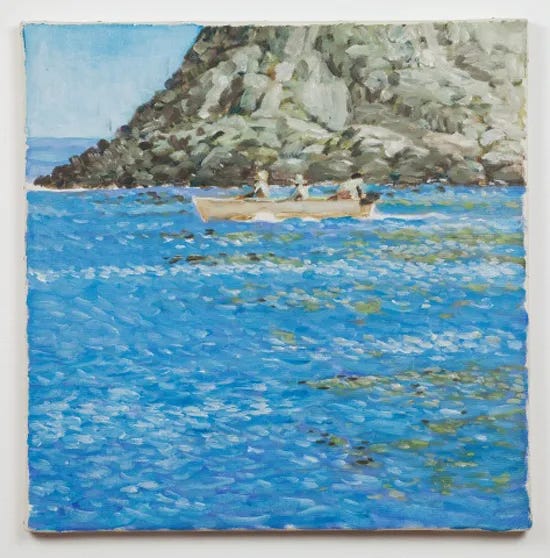
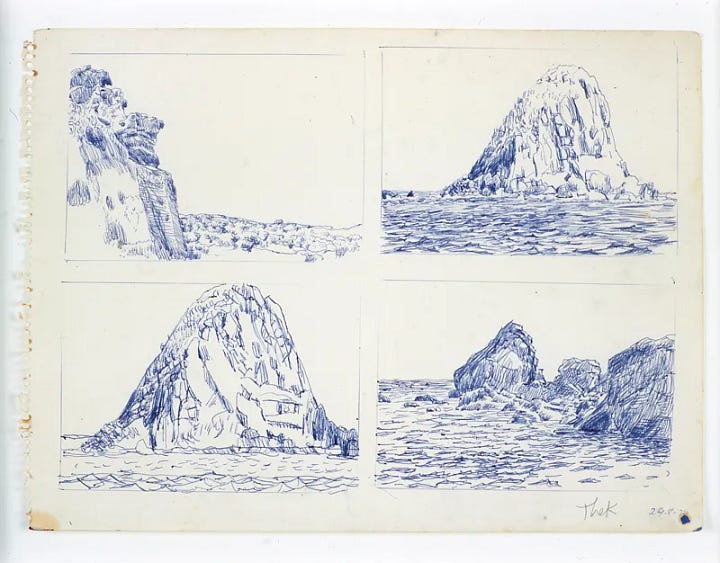
The real reason
I told myself that in January I would start writing a new book, but I do not want to write a new book. I just want to write Substacks. Learning Italian was another form of noble procrastination. I fantasized that Italian would come upon me swiftly, maybe even sneaking into my mouth of its own accord, because I had all that room in my mouth, head, and body now that I wasn’t finishing or starting a book.
Best case, this would spark my Jhumpa Lahiri moment, discovering literature anew and askance through reducing myself to the fundamentals of expression, the process of acquiring language releasing a rivulet of unleashed creativity that would trickle through the cracks of linguistic obstacles and pool into a masterpiece. I could join Nabokov, Kundera, Pessoa, Hosseini, Li in exophony, the practice of writing in a non-native language, possibly the most savant literary behavior imaginable.
Or I would not write anything but I would be able to lie about it in Italian.
My friend made a meme about my reasons for learning Italian. You can practice translating:
An obstacle
I have an answer to “where are you from,” but it is dishonest unless I hedge by saying that I moved around a lot. I am one of those people who moved places a lot from the age of two weeks old until sometime in my twenties. Being “between cultures” and “adaptable” is everything you need to know about my fundamental self-conception, unnameable attachment style, and phobia of speaking on the phone. You can read all about what it it was like for me to be raised in the field by anthropologists if you want. (Sometimes other anthropologist offspring read that essay and email me being like “shit.”)
The upshot is that I can enter any group and force myself into a social relation; the downshot is that I associate fluency of all kinds—with a place, a group, a culture/way of being, and a language—with impending loss. If you are transient in practice and in soul and expect to be imminently uprooted, you know you are just learning it to lose it. Beginnings are endings, starts are false starts, and what ever it is, you can’t take it with you.
A few years ago I decided to unlearn the practice of uprooting myself as default approach and try to COMMIT to a tethered life with some hard edges. An unexpected side effect was that I developed a psychological blockage to learning a new language. Can you decide to stop starting over, but start SOME things from scratch? (If you decide to stop starting over, can you write a new book?? These things are not unrelated.)
Dolcevita
I went to the Italian class, sat down alongside a group of 18-year-old Erasmus students, and got addicted. I left ecstatic, stoned. My brain felt like it had been palpated in a long-forgotten erogenous zone. I hadn’t concentrated this hard on any single thing since—? I’d forgotten how learning a language makes you feel like a genius and an idiot in equal measure, oscillating between grandiosity and humility as you make incremental progress, a combination that appeals to me exactly because, again, I am a writer, the most grandiose yet embarrassing job.
My Lahiri moment did not happen. I did not write a budding work of exophonic literature. But I did learn that there’s a Rome-specific word in Italian to describe people who live in Roman apartments with terraces: terrazzari. Fancy people.
I also learned that the Italian word for “turtleneck” is dolcevita, because Marcello Mastroianni was wearing a high-necked item during the finale scene of La Dolce Vita, and as his career went on his sexy deployment of tightneck sweaters increased to iconic proportions. (You’ll also find theories that the turtleneck term is actually inspired by another of the film’s characters, Pierone, played by Giò Stajano, who was one of the first Italian movie stars to be out as gay in the 60s and then in the 80s, one of the first famous trans women: Maria Gioacchina Stajano Starace, or Contessa Briganti di Panico. You’ll want to spend time reading about the Contessa.)
Brief turtleneck digression
The reason turtlenecks became de rigeur in the 60s for public intellectual Euro men à la Foucault and Sartre is that, for various reasons, certain academic males had no wives at home to iron their shirt collars. Starched/crisp collars had previously been a prerequisite for public intellectual manhood. Rather than learn to press their own shirts, they turtled. The turtleneck solved a reproductive labor problem under the guise of fashion. I think about this every time I put one on.
In conclusion
I took two weeks of Italian lessons. Then I talked constantly in Italian to anyone who would indulge me. By the end of the month I could carry on a five-minute conversation about La Dolce Vita.
With hubris, I feel like I can almost Hang Out in Italian. And Hanging Out is all I’ve ever wanted from languages. I don’t want to read Foucault in French, I want to rent scooters, make pals, and go to bars, bookstores, and protests. All you have to do for that is to relentlessly subject everyone to your mistakes.
This is the reason that I learned fluent Portuguese during six months in Brazil: my friends in São Paulo constantly ribbed me for sounding stupid but held my hand when I got lost and didn’t entertain the possibility of switching to English. And it’s why I never learned Real German, because in Berlin, I turned to stone after the first twenty times someone refused to understand me unless I re-tried my sentence with the Dative or the pharmacist passed judgment when I described (yes) a UTI; the truism that you don’t have to learn if you’re an “expat” versus a “migrant” is true; there is PLENTY of discourse on that, don’t @ me.
So it was during my six months in Brazil 20 years ago that I had my one and only Ben Lerner Leaving the Atocha Station moment where, in the midst of apologizing for not knowing how to speak the language, the person you’re talking to points out that you’re apologizing in the language. If you’ve had it, that moment is ecstatic. (That was probably my one chance to begin writing a masterpiece of exophonic literature and I went to carnaval in Rio instead.)
Recipe for Atocha Station moment
You gotta frontload the language. You gotta Eat Pray Love the language. They call it “immersion” when you’re a teenage au pair, although during my Spanish immersion summer in Salamanca I exclusively smoked hash by the cathedral; got bronchitis; took a train to the countryside with a bunch of exchange students searching for a techno club called Radikal. But you can skip Club Radikal and make immersion happen now that you’re an adult.
If you have no friends but want to practice, I like the Coffee Break series, where a nice, earnest Scottish man perfects his abilities to speak seemingly every language by dissecting grammar quirks with native speakers. Sometimes I pay for DuoLingo max, or whatever the tier of subscription is called where the animated bird dances and your phone vibrates whenever you “win” at grammar; and there is nothing wrong with a spot of DuoLinguing (conjugate pls) for a gamified refresher. But DuoLingo is a toupee, not hair, and it is not the way to learn a language. To learn a language, you need Hubris and you need to Hang Out.
Am I going to leave the USA for good
No. Probably not. Not yet. No.
Recommendations for this week
I am currently trying to Abolish The Family while also trying to buy an apartment with my literal husband. If you are facing similarly impossible paradoxes where your personal lived experience is irreconcilable with what you believe is necessary for e.g. revolution:
Get a copy of the catalog for the exhibition Burning Down the House that happened at Kunsthalle St Gallen in Switzerland last year. My friend Melanie Bühler curated it and made the book and it’s one of the best art books I’ve seen in years.
You can read Laura McLean-Ferris on artworks that embody care relations and Mirthe Berentsen interviewing Sophie Lewis and Helen Hester on repro-tech. You can see pictures of artworks you may never have a chance to see in person such as documentation of the Dutch artist PINK de Thierry’s project where she brought her family to stay in a museum overnight. As a Mierle Laderman Ukeles head, I couldn’t believe I didn’t know about PINK.
Buy the book at Amant in Brooklyn or DM me because I have a pile of them.
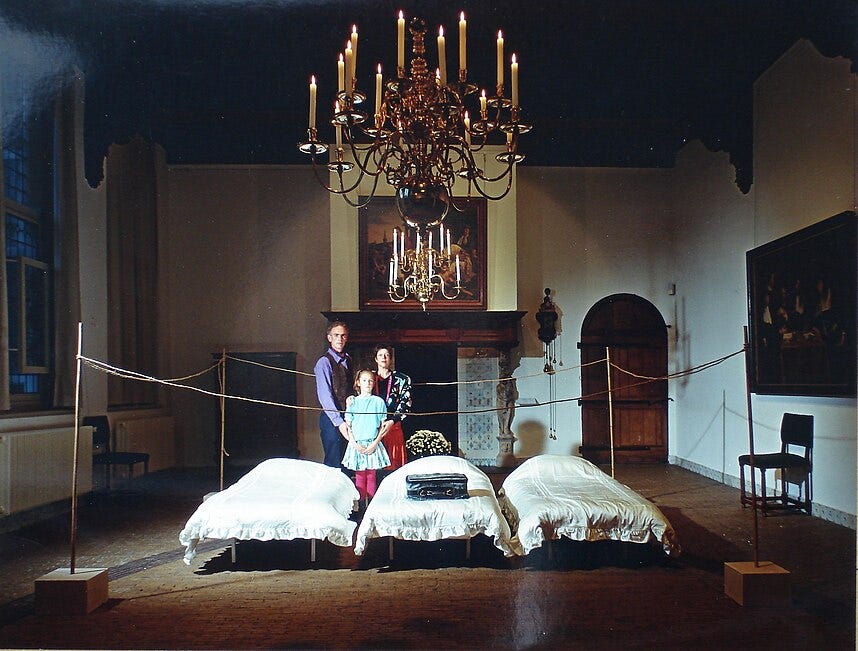
Activities
I saw N.K. Jemisin speak at Pioneer Works. It’s wild to watch someone so mega talk about her work and feel zero question that she deserves all the awards. She couldn’t have been more clear or more entertaining. Give this woman another award. Also I love how when sci-fi and fantasy authors give talks they always explicitly refer to themselves as nerds, as if that weren’t a prerequisite for the job (or as if it means anything related to subculture? what is “nerd” now?).
I currently have “walking pneumonia” but the CityMD doctor says it is okay if I go to the Whitney opening to see Marina Zurkow’s installation.
Tomorrow on Friday April 5 Lux is launching its new issue at Francis Kite. The issue reaffirms that Lux is the best magazine in the country. I will be reading it at the pulmonologist this afternoon.




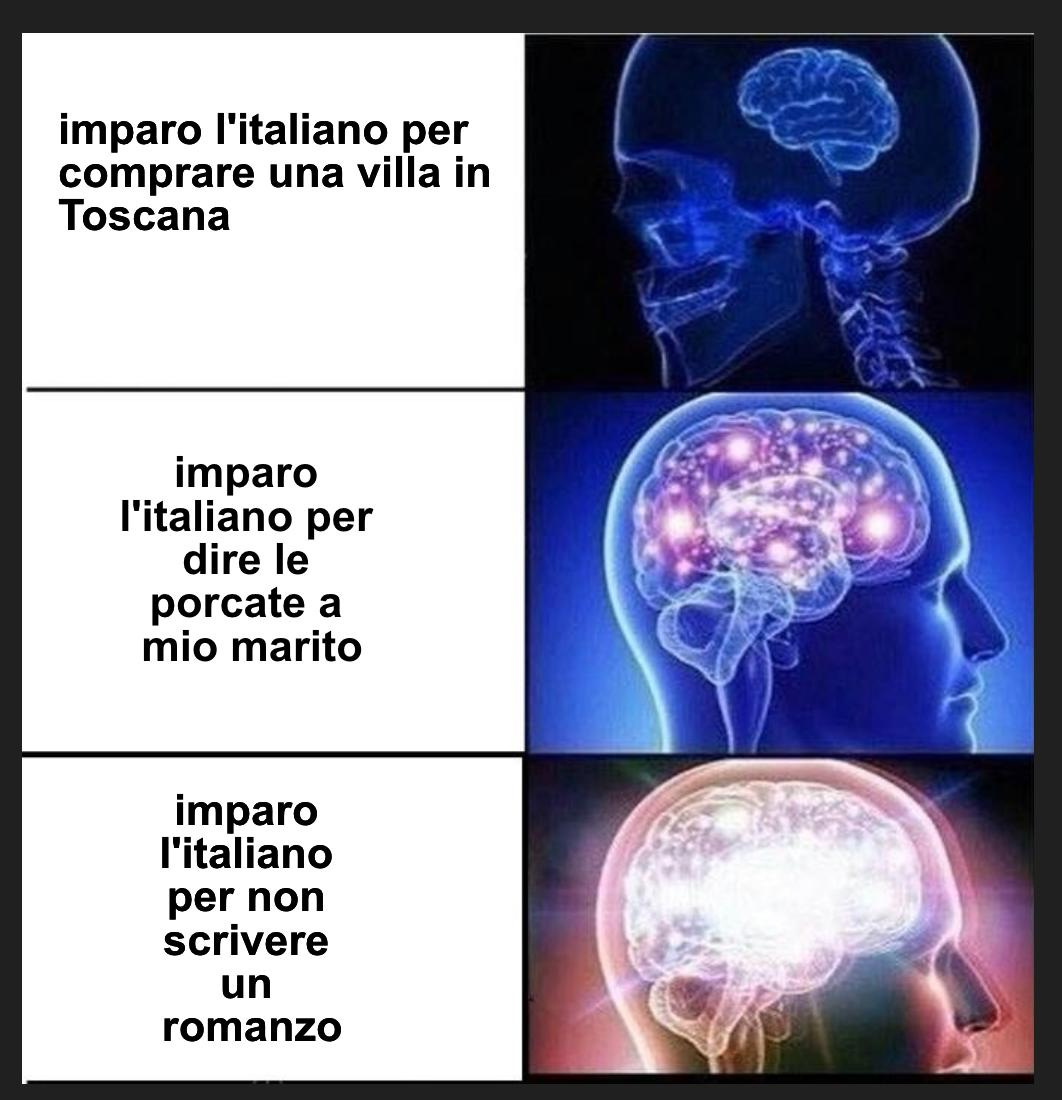


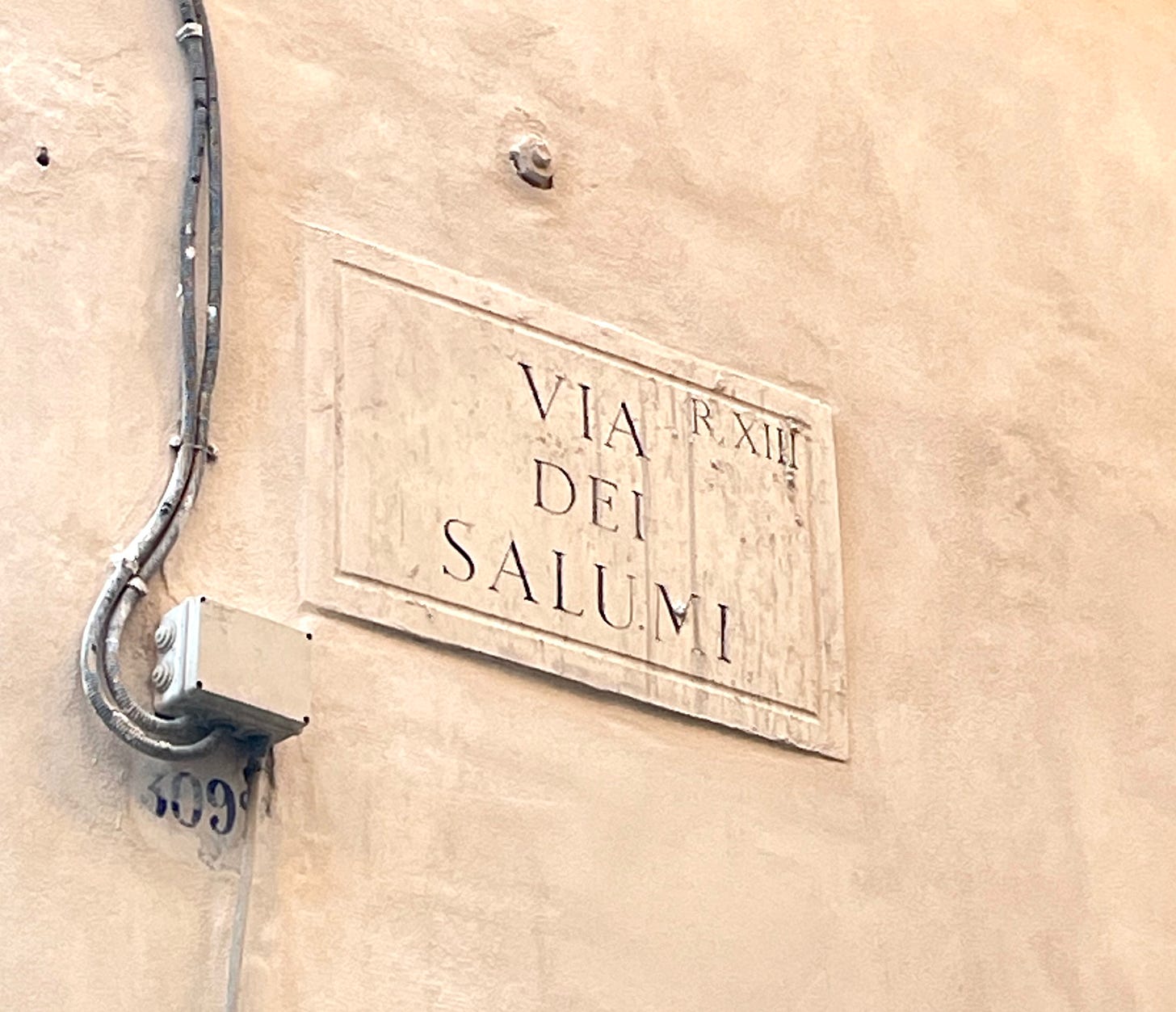
Now I want salami.